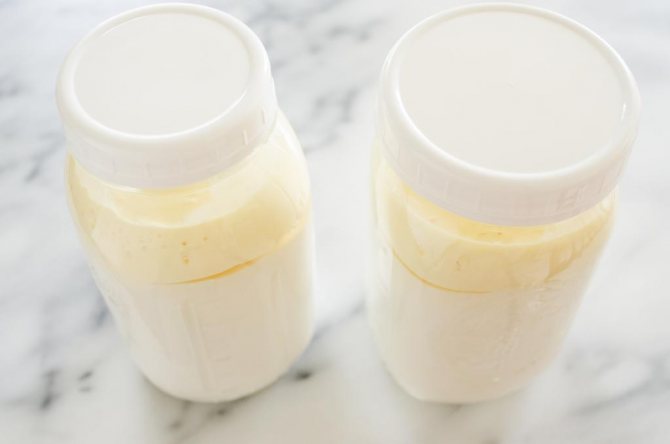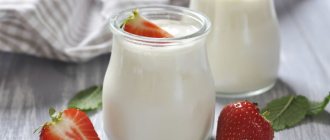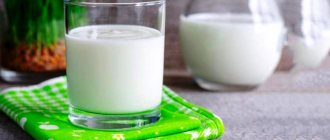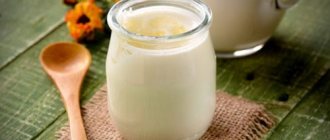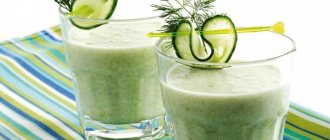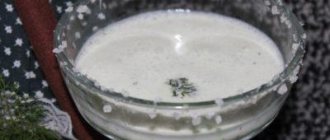Kefir is a lactic acid fermentation food product that is healthy for the human body. This drink is rich in minerals, vitamins, acids and beneficial bacteria. Kefir perfectly satisfies hunger, relaxes and soothes after a hard day at work, and improves mood. Since the calorie content of kefir is very low, its use is recommended for people who want to lose weight. Bifidobacteria, which are contained in this drink, stop the development of putrefactive processes in the intestines. Kefir normalizes metabolic processes in the body, thus helping to control body weight. With a low calorie content, kefir significantly improves the functioning of the digestive system and helps strengthen muscles and blood vessels.
Composition and calorie content of kefir of different fat contents
The most beneficial for human health is kefir with a low fat content, but not completely fat-free, namely 1%. The chemical composition of drinks of different fat content (1%, 2.5%, 3.2%) is similar in the content of nutrients and beneficial bacteria, but differs in the amount of cholesterol.
Calorie content of kefir per 100 g:
- 1% – 40 kcal;
- 2.5% – 53 kcal;
- 3.2% – 59 kcal;
- 0% (low fat) – 38 kcal;
- 2% – 50 kcal;
- homemade - 55 kcal;
- with sugar – 142 kcal;
- with buckwheat – 115.2 kcal;
- with oatmeal – 95 kcal;
- pancakes with kefir – 194.8 kcal;
- pancakes – 193.2 kcal;
- okroshka – 59.5 kcal;
- manna – 203.5 kcal.
1 glass with a capacity of 200 ml of kefir with 1% fat content contains 80 kcal, in a glass with a capacity of 250 ml – 100 kcal. There are 2 kcal in 1 teaspoon, and 8.2 kcal in a tablespoon. 1 liter of kefir contains 400 kcal.
Nutritional value of the drink per 100 grams:
| Fat content | Fats | Squirrels | Carbohydrates | Water | Organic acids | Ethanol |
| Kefir 1% | 1 g | 3 g | 4 g | 90.4 g | 0.9 g | 0.03 g |
| Kefir 2.5% | 2.5 g | 2.9 g | 4 g | 89 g | 0.9 g | 0.03 g |
| Kefir 3.2% | 3.2 g | 2.9 g | 4 g | 88.3 g | 0.9 g | 0.03 g |
Ratio of BJU kefir per 100 g:
- 1% – 1/0.3/1.3;
- 2,5% – 1/0.9/1.4;
- 3,5% – 1/1.1/.1.4.
The chemical composition of kefir is presented in table form:
| Component name | Kefir contains 1% fat content |
| Zinc, mg | 0,4 |
| Iron, mg | 0,1 |
| Fluorine, mcg | 20 |
| Aluminum, mg | 0,05 |
| Iodine, mcg | 9 |
| Strontium, mcg | 17 |
| Selenium, mcg | 1 |
| Potassium, mg | 146 |
| Sulfur, mg | 30 |
| Calcium, mg | 120 |
| Phosphorus, mg | 90 |
| Sodium, mg | 50 |
| Chlorine, mg | 100 |
| Magnesium, mg | 14 |
| Thiamine, mg | 0,04 |
| Choline, mg | 15,8 |
| Vitamin PP, mg | 0,9 |
| Ascorbic acid, mg | 0,7 |
| Vitamin D, mcg | 0,012 |
| Vitamin B2, mg | 0,17 |
In addition, the drink with a fat content of 1%, 2.5% and 3.2% contains disaccharides in the amount of 4 g per 100 g, which is approximately equal to one teaspoon of sugar, so there is no need to add additional sweetener before drinking. Kefir also contains poly- and monounsaturated fatty acids, such as omega-3 and omega-6. The amount of cholesterol in 1% kefir is 3 mg, in 2.5% - 8 mg, in 3.2% - 9 mg per 100 g.
Calorie calculation for a 200 gram serving
As an example, we will give the calculation of a portion equal to 200 grams - this is one of the standard weight measures that is popular. Its calorie content can be calculated by simple calculation.
The easiest and most universal option (suitable for calculating any volume of a product or ready-made dish) is calculation by multiplying the known calorie content (100 grams) by a factor of 2 obtained from division (200 / 100 grams).
Calorie content of a 200 gram serving = 50 * 2 = 100 kcal.
Beneficial and healing properties for the body
Kefir of different fat contents has beneficial and healing properties for the female and male body. The drink is useful to drink both in the morning as a complement to the main dish, for example, buckwheat or oatmeal, for quick saturation, and at night to improve digestion and sleep.
Drinking 1-2 glasses of kefir every day has a healing effect on human health, namely:
- The functioning of the gastrointestinal tract improves. Thanks to the probiotics included in the drink, you can cure indigestion, eliminate constipation (thanks to the laxative properties of kefir) and restore normal digestive function after taking a course of antibiotics.
- Symptoms of diseases such as ulcerative colitis, irritable bowel syndrome and Crohn's disease are reduced. In addition, the drink can be drunk to prevent stomach and duodenal ulcers.
- Kefir is a preventative against infections such as Helicobacter, E. coli, and salmonella.
- The risk of developing osteoporosis is reduced, bones are strengthened.
- The risk of malignant formations and the appearance of cancer cells is reduced.
- The symptoms of allergies and asthma are reduced.
- The intestines and liver are cleansed of toxins, waste, and salts.
- The weight loss process accelerates.
- Swelling decreases. Excess fluid is removed from the body due to the diuretic properties of the drink.
- The functioning of the cardiovascular system improves. Blood pressure is normalized and the level of bad cholesterol in the blood is reduced, which reduces the likelihood of developing thrombosis.
Kefir can be drunk by people with lactose intolerance. The drink is useful for athletes after physical activity, as it helps to quickly restore strength, satisfy hunger and fill the body with energy. In addition, the protein contained in the composition helps build muscle mass.
Note: after an exhausting physical workout, it is necessary to saturate the body not only with proteins, but also with carbohydrates. To do this, athletes are recommended to make a protein shake from kefir with the addition of banana.
Women use kefir for cosmetic purposes. It is used to make nourishing masks for the face and hair roots. The drink relieves skin redness and relieves pain from sunburn.
Low-fat kefir has the same health benefits as a 1% fat drink, but contains fewer calories and no fat.
© Konstiantyn Zapylaie — stock.adobe.com
The benefits of homemade kefir
Most often, kefir prepared at home contains more beneficial bacteria, vitamins, as well as micro- and macroelements and polyunsaturated fatty acids. However, homemade fermented milk drink has a shorter shelf life.
The benefits of homemade kefir for humans are as follows:
- The one-day drink has laxative properties, so it is recommended to drink it for bowel problems such as constipation. It removes waste and toxins from the body.
- The two-day drink is recommended for people with diseases such as gastritis, diabetes, hypertension, kidney and liver diseases, colitis, heart disease, and bronchitis. Recommended for those who have suffered a stroke and myocardial infarction.
- Three-day kefir has the opposite properties to one-day kefir. It strengthens, so it is recommended to drink the drink to treat indigestion.
Also, one-day homemade kefir helps with flatulence, bloating and heaviness in the stomach. To eliminate discomfort, it is recommended to drink the drink in the morning or at night before bed.
Benefits of buckwheat and cinnamon
To improve digestion, it is recommended to start the morning with kefir, but not in its pure form, but together with other products, such as buckwheat, oatmeal, cereals, flax and cinnamon, to enhance the positive effect on the body.
It is useful to eat raw buckwheat soaked/brewed with kefir on an empty stomach, since buckwheat contains a large amount of dietary fiber, and kefir contains bifidobacteria. Eating the dish speeds up the process of cleansing the intestines of toxins, after which it fills it with beneficial flora.
Kefir with the addition of cinnamon helps you lose weight and quickly satisfies your hunger. Cinnamon reduces appetite and helps speed up metabolism, while kefir cleanses the intestines, making cinnamon components better absorbed into the blood.
Kefir with the addition of flax and grains helps you feel full faster, cleanse your intestines and maintain a feeling of fullness for a longer period.
Interesting Facts
There are real legends about the origin of kefir. It is believed that the prophet Magomed presented the mountaineers with something similar in appearance to cauliflower as a gift. It was kefir starter. The mountaineers gave it the name “millet of the prophet.” Residents of North Ossetia and Kabardino-Balkaria are still debating where exactly the birthplace of this fermented milk drink is.
So, the Caucasians carefully kept the gift they received, not allowing anyone to take possession of this miracle. But at the beginning of the last century, “non-believers” managed to get hold of the recipe for making kefir. The fact is that the young beauty Sakharova arrived in the Caucasus in order to find out the secret of producing the drink. A local prince fell in love with her and even kidnapped her.
All the forces of the gendarmerie were thrown into searching for the beauty. Sakharov managed to be released, but the prince was threatened with trial. The girl forgave him, asking for a dozen mushrooms as compensation. Kefir began to be produced on an industrial scale in 1913.
Kefir as a means for weight loss
An important stage of losing weight is cleansing the body of excess fluid, waste, salts and toxins. The presence of by-products in the body negatively affects a person’s well-being, causing fatigue, headaches, and allergies. Systematic consumption of 1% fat kefir ensures a regular and uninterrupted process of cleansing the intestines of harmful substances.
There are many mono- and regular diets using kefir. With its help, it is recommended to arrange fasting days to improve digestion and relieve swelling. During a fasting day, the daily dose of kefir consumption should not exceed 2 liters. It is recommended to take it with a higher fat content, for example, 2.5%, to satisfy the feeling of hunger and maintain satiety for a longer period.
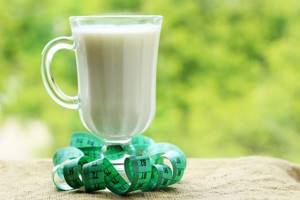
© sabdiz — stock.adobe.com
In addition to following diets for weight loss, you can include in your diet dishes using a drink with 1% fat content. Eat buckwheat, oatmeal and fruit seasoned with kefir for breakfast.
Instead of a snack, it is recommended to drink a glass of kefir with a spoonful of honey, flaxseeds (or flour), cinnamon, turmeric or cereals. An alternative option is a kefir smoothie with beets, apples, ginger or cucumber.
To lose weight, it is recommended to drink kefir at night instead of dinner in an amount of no more than 1 glass and without adding fruits or other foods. The drink should be consumed slowly and with a small spoon to satiate and satisfy the feeling of hunger. Thanks to this method of consumption, kefir is better absorbed.
Harm to health and contraindications
Consuming low-quality kefir or a drink with an expired kefir risk of food poisoning.
Contraindications to drinking fermented milk drink are as follows:
- allergy;
- exacerbation of gastritis;
- ulcer in the acute stage with high acidity;
- poisoning;
- gastrointestinal infection.
Drinking homemade three-day kefir is not recommended for people with exacerbation of any stomach or intestinal diseases and those who suffer from kidney diseases.
You cannot follow a diet in which breakfast consists of buckwheat and kefir for more than two weeks in a row. Exceeding the recommended period may cause deterioration in health, namely headaches, weakness in the body and fatigue.
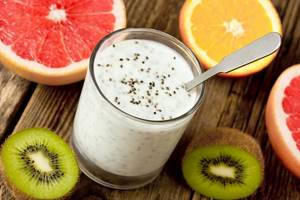
© san_ta — stock.adobe.com
Results
Kefir is a low-calorie drink that contains beneficial bacteria that have a beneficial effect on the functioning of the intestines and digestion in general. With the help of kefir, you can lose weight, cleanse the body of toxins and impurities, improve overall well-being and get rid of puffiness.
The drink is useful to drink in the morning on an empty stomach and before bed. It can be consumed either alone or together with other ingredients, for example, buckwheat, flaxseeds, oatmeal, cinnamon, etc. Kefir is useful to drink after sports to saturate the body with energy, satisfy hunger and strengthen muscle tissue.
Rate the material
Share:
What happens if you drink kefir at night?
Ideally, in order for the body to receive all the beneficial elements it needs from food, the products must be broken down by intestinal bacteria. The process begins with bacteria processing food, and then the intestines suck out all the necessary substances. But, unfortunately, these processes are sometimes disrupted and the intestines are colonized by harmful microorganisms instead of beneficial ones. The result is disastrous - food is poorly digested, the body suffers from a lack of essential nutrients, and such unpleasant consequences as bloating, diarrhea, and nausea appear. Dysbacteriosis negatively affects other organs. Kefir is rich in millions of beneficial bacteria, whose task is not only to ensure comfortable intestinal function, but to destroy their harmful counterparts. If you suffer from bloating or indigestion, treat yourself to kefir.
